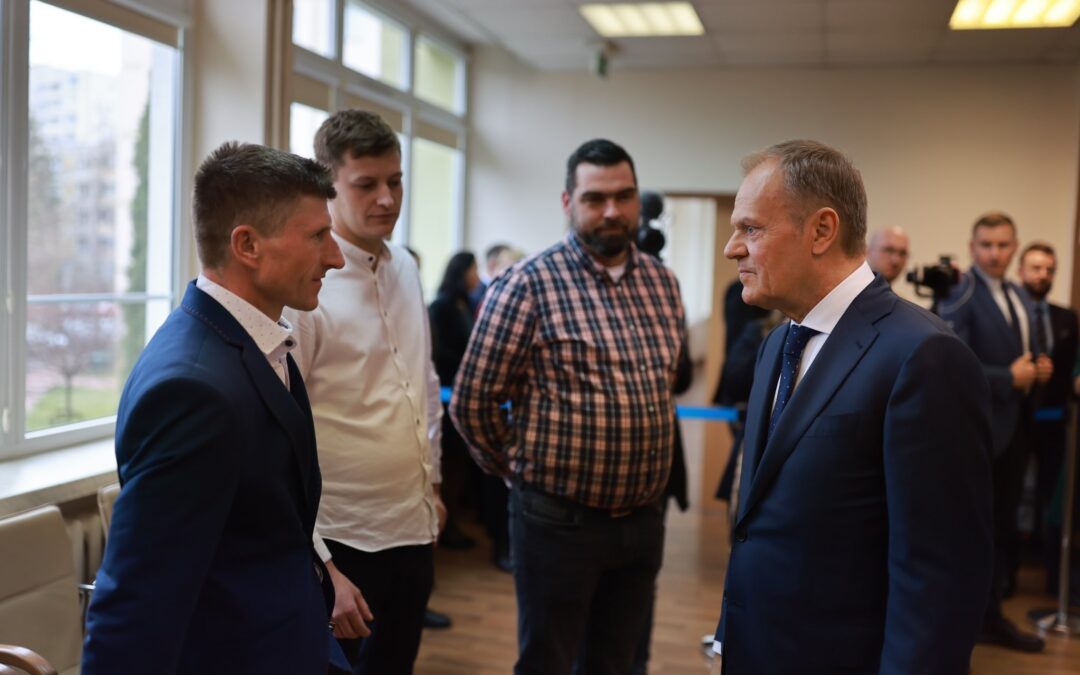Prime Minister Donald Tusk has held his first set of talks with the representatives of the Polish farmers who have this month been holding a series of demonstrations and blockades in protest against Ukrainian agricultural imports and EU climate policy.
Both Tusk and farmers’ leaders afterwards suggested the talks had been positive, with the prime minister saying that his government would lobby Brussels to suspend or withdraw parts of the EU’s planned “Green Deal” relating to agriculture and advocate an embargo on agricultural products from Russia and Belarus.
Premier @donaldtusk podczas konferencji prasowej w #KPRM: Jestem w stanie wynegocjować w Brukseli zmianę stanowiska UE, jeśli chodzi o wolny handel z Ukrainą, ale także jeśli chodzi o sankcje czy embargo na produkty rolne rosyjskie, białoruskie oraz o przepisy Zielonego Ładu. pic.twitter.com/ByBwmksata
— Kancelaria Premiera (@PremierRP) February 29, 2024
During a press conference after the meeting, Tusk highlighted that the government and farmers have a common goal of protecting Polish and European markets from the “unfair” and “crushing” consequences of the “ill-advised” decision to liberalise trade with Ukraine after Russia’s invasion.
“Ukrainian grain cannot flow duty-free and like a wide river into Poland,” he said, adding that, while Ukraine must be helped in its defence against Russian aggression, “the victims of this war must not be Polish farmers”.
“The interests of Ukrainian agro-holdings cannot override the interests of Europe and our farmers, and this has nothing to do with Ukraine’s security,” said Tusk, who since becoming prime minister in December has been a vocal proponent of greater international support for Kyiv.
"There is nothing more important than supporting Ukraine," said PM @donaldtusk in Kyiv on his first trip to a foreign capital since taking office last month
"Anyone in the free world who pretends to be neutral deserves the darkest place in political hell" https://t.co/DQmhCyI4Qh
— Notes from Poland 🇵🇱 (@notesfrompoland) January 22, 2024
Tusk, a former president of the European Council, said he was confident that he could negotiate a change of the EU’s position on the Green Deal.
He outlined that the demands of the Polish side – the protesters and the government – would be that “practically all” provisions in the Green Deal relating to agriculture “must be suspended and withdrawn”. Poland will also seek an embargo on products from Russia and Belarus.
“It is inconceivable that we are saying that Ukraine should be subjected to duties, while Russian and Belarusian products enter Europe without restrictions,” Tusk explained.
The West should use $300bn of frozen Russian assets to help Ukraine, says @donaldtusk.
He also pledged to tell Orbán "to his face" at a summit this week that Hungary risks "placing itself outside our EU and NATO communities" if it does not support Ukraine https://t.co/7KKO9qSWdT
— Notes from Poland 🇵🇱 (@notesfrompoland) February 26, 2024
A guaranteed minimum price for Ukrainian grain entering the EU was also discussed as one of the potential solutions to the crisis, as was the possibility of the EU financing the purchase and transport of grain from European markets as humanitarian aid for countries in need.
Tusk also referred to the possibility of closing the border with Ukraine to all trade, an idea he raised yesterday. “This is not a dream scenario”, and would “have mutual consequences”, but “we must keep this possibility in mind if our demands do not resonate in Brussels and on the Ukrainian side”, he warned.
If implemented, this solution would concern only the movement of goods, not humanitarian and military transport, added Tusk.
Poland's @donaldtusk says his government is "talking with the Ukrainian side about temporarily closing the border and closing the exchange of trade" amid farmers' protests.
But Ukraine denies that any such talks are taking place https://t.co/YUQFX8TyTN
— Notes from Poland 🇵🇱 (@notesfrompoland) February 29, 2024
One of the leaders of the protests, farmers’ union chief Sławomir Izdebski, told broadcaster TVN after the meeting with Tusk that “it is good that such a summit has taken place” and called it a “step forward”.
He said that they would “give it a few days” to see what the outcome would be, “because the prime minister cannot close the border or solve the [problems with] the Green Deal in an ad hoc way”. However, he also emphasised that the protests would continue in the meantime.
Andrzej Sobociński, a farmer who attended the talks, told TVN that Tusk had “listened to all the arguments from the representatives of the grassroots protests” and that they had had a “very constructive conversation”
However, another participant, Krzysztof Chmiel, noted that “no decisions have actually been made” and “we haven’t heard anything specific”. He said he hoped that Tusk would propose some “specific, strong actions” by the time further talks are held in a few days time.
Over a thousand farmers, accompanied by 200 tractors, protested in Warsaw yesterday.
They are calling on the government to do more to support them amid soaring inflation that has raised costs of fuel and fertiliser https://t.co/48HDRBkUwz
— Notes from Poland 🇵🇱 (@notesfrompoland) February 24, 2022

Notes from Poland is run by a small editorial team and published by an independent, non-profit foundation that is funded through donations from our readers. We cannot do what we do without your support.
Main image credit: PremierRP/X

Agata Pyka is a former assistant editor at Notes from Poland. She specialises in Central and Eastern European affairs, cybersecurity, and investigative reporting. She holds a master’s degree in political communication from the University of Amsterdam, and her work has appeared in Euractiv, the Balkan Investigative Reporting Network (BIRN), and The European Correspondent, among others.



















